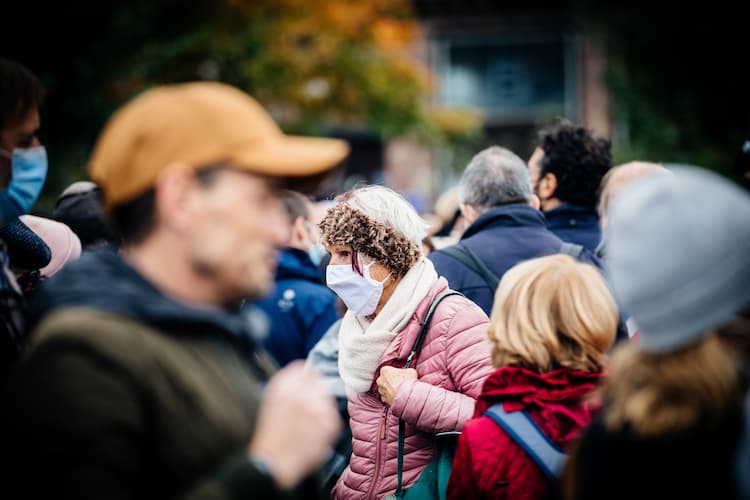SCOTUS Rejects Religious exemption Challenge to COVID-19 Vaccine Mandate

In Does v. Mills, 595 U.S. ____ (2021), the U.S. Supreme Court refused to issue an injunction to prevent Maine from enforcing a COVID-19 vaccine mandate for health care workers that lacks religious exemptions. The Court denied the application for injunctive relief by a 6-3 vote.
Facts of the Case
Maine’s Center for Disease Control (“Maine CDC”) promulgated a regulation effective August 12, 2021, requiring all workers in licensed healthcare facilities to be vaccinated against the COVID-19 virus. Under state law, a healthcare worker may claim an exemption from the requirement only if a medical practitioner certifies that vaccination “may be medically inadvisable.” Maine has mandated that its healthcare workers be vaccinated against certain contagious diseases since 1989. In May 2019, the state eliminated religious or philosophical exemptions to any of its vaccination requirements. The COVID-19 mandate complies with that state law.
Several Maine healthcare workers filed suit, alleging that the COVID-19 vaccination requirement violates their rights, including the U.S. Constitution’s Free Exercise Clause. Their suit against the Governor, the commissioner of the Maine Department of Health and Human Services (“Maine HHS”), and the director of Maine CDC alleged violations of the Free Exercise Clause, Supremacy Clause, Equal Protection Clause, and 42 U.S.C. § 1985 and sought a preliminary injunction to prevent enforcement of the regulation against them.
The district court denied the request, and the First Circuit Court of Appeals affirmed. It held that Maine’s vaccine mandate did not run afoul of the Constitution. In support, the appeals court noted that the rule did not single out religion for disfavored treatment, but rather was a neutral law of general applicability.
The First Circuit also rejected the healthcare workers’ argument that by providing a medical exemption, the regulation was not generally applicable. “Providing health care workers with medically contraindicated vaccines would threaten the health of those workers and thus compromise both their own health and their ability to provide care,” Judge Sandra Lynch wrote.
The First Circuit went on to find that the rule easily satisfied rational basis review. “Few interests are more compelling than protecting public health against a deadly virus,” Judge Lynch wrote. “In promulgating the rule at issue here, Maine has acted in response to this virus to protect its healthcare system by meeting its three goals of preventing the overwhelming of its healthcare system, protecting those most vulnerable to the virus and to an overwhelmed healthcare system, and protecting the health of all Maine residents.”
Majority Decision
A majority of the Supreme Court denied the injunction in a brief order and without issuing a written opinion. Justice Amy Coney Barrett filed a concurrence, which was joined by Justice Brett M. Kavanaugh. Justice Barrett suggested that their vote regarding emergency relief may not be the same if the case came before the Court on the merits. She also cautioned that the Court should be wary of making significant decisions “on a short fuse without benefit of full briefing and oral argument.”
Dissent
Justices Clarence Thomas, Samuel A. Alito Jr. and Neil M. Gorsuch dissented. “Where many other states have adopted religious exemptions, Maine has charted a different course,” Justice Gorsuch wrote on behalf of the dissenting justices. “There, health care workers who have served on the front line of a pandemic for the last 18 months are now being fired and their practices shuttered. All for adhering to their constitutionally protected religious beliefs. Their plight is worthy of our attention.”
Previous Articles
SCOTUS Wraps Up Oral Arguments for the Term
by DONALD SCARINCI on May 17, 2022
The U.S. Supreme Court has concluded its oral arguments for the October 2021 Term. The justices hea...
SCOTUS Rules Censure of Elected Board Member Didn’t Violate First Amendment
by DONALD SCARINCI on May 10, 2022
In Houston Community College System v. Wilson, 595 U.S. ____ (2022), the U.S. Supreme Court held th...
Supreme Court Breach Is Not the First Involving Roe v. Wade
by DONALD SCARINCI on
The recent disclosure of Justice Samuel Alito’s decision purporting to overturn Roe v. Wade is ar...
The Amendments
-
Amendment1
- Establishment ClauseFree Exercise Clause
- Freedom of Speech
- Freedoms of Press
- Freedom of Assembly, and Petitition
-
Amendment2
- The Right to Bear Arms
-
Amendment4
- Unreasonable Searches and Seizures
-
Amendment5
- Due Process
- Eminent Domain
- Rights of Criminal Defendants
Preamble to the Bill of Rights
Congress of the United States begun and held at the City of New-York, on Wednesday the fourth of March, one thousand seven hundred and eighty nine.
THE Conventions of a number of the States, having at the time of their adopting the Constitution, expressed a desire, in order to prevent misconstruction or abuse of its powers, that further declaratory and restrictive clauses should be added: And as extending the ground of public confidence in the Government, will best ensure the beneficent ends of its institution.




